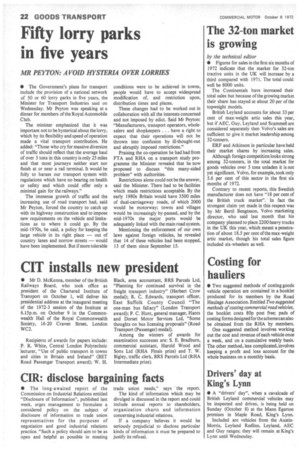Fifty lorry parks in five years
Page 24

If you've noticed an error in this article please click here to report it so we can fix it.
MR PEYTON: AVOID HYSTERIA OVER LORRIES
• The Government's plans for transport include the provision of a national network of 50 or 60 lorry parks in five years, the Minister for Transport Industries said on Wednesday. Mr Peyton was speaking at a dinner for members of the Royal Automobile Club.
The minister emphasized that it was important not to be hysterical about the lorry, which by its flexibility and speed of operation made a vital transport contribution. He added: "Those who cry for massive diversion of traffic should reflect that the average haul of over 3 tons in this country is only 25 miles and that most journeys neither start nor finish at or near a rail terminal. It would be folly to harass our transport system with regulations which have no bearing on health or safety and which could offer only a minimal gain for the railways."
The immense growth of traffic and the increasing use of road transport had, said Mr Peyton, forced the country to catch up with its highway construction and to impose new requirements on the vehicle and limitations as to where it could go. By the mid-1970s, he said, a policy for keeping the large vehicle in its right place — out of country lanes and norrow streets — would have been implemented. But if more tolerable conditions were to be achieved in towns, people would have to accept widespread modification of, and restriction upon, distribution times and places.
These changes had to be worked out in collaboration with all the interests concerned and not imposed by edict. Said Mr Peyton: "Manufacturers, transport operators, wholesalers and shopkeepers . . . have a right to expect that their operations will not be thrown into confusion by ill-thought-out and abruptly imposed restrictions."
Praising the co-operation he had had from FTA and RHA on a transport study programme the Minister revealed that he now proposed to discuss "this many-sided problem" with authorities.
Restrictions alone could not be the answer, said the Minister. There had to be facilities which made restrictions acceptable. By the early 1980s Britain would have 3500 miles of dual-carriageway roads, of which 2000 would be motorway; towns and villages would be increasingly by-passed, and by the mid-1970s the major ports would be adequately linked with the main road system.
Mentioning the enforcement of our own laws against foreign vehicles, he revealed that 14 of these vehicles had been stopped, 13 of them since September 15.






































































































